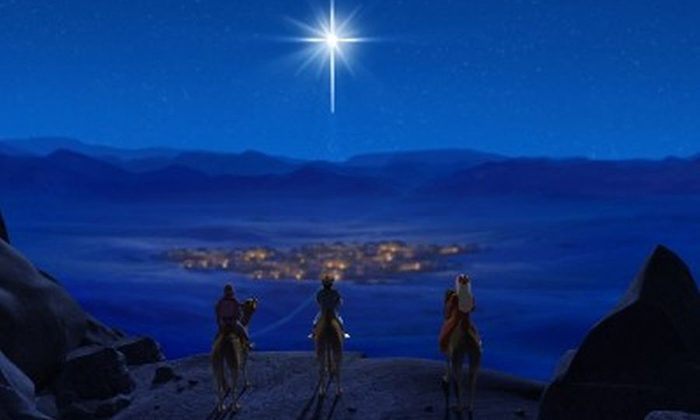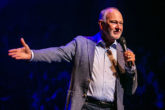
Photo: Wikimedia Commons
(The Gospel Coalition) – I sometimes wonder if my life is so small and slow and ordinary that it’s inconsequential. My family is wonderful and regular; I lead a church plant that lacks in style but makes it up in substance; we live in a flyover state in the Midwest. If my life were a TV show, an audience wouldn’t last beyond the pilot.
I’m tempted to think, Should I be doing something more? Should I be in a more exciting place? Wouldn’t God be more glorified by a more extraordinary church?
In the middle of my personal and pastoral insecurities, the season of Advent speaks into my fears. Each Advent, I become especially aware of the paradox of Christmas and the advent (arrival) of our hope in Christ. In the paradox, I’m discovering that perhaps this ordinary life, this regular family, and this humble, newborn church are the exact types of places God likes to appear.
Paradox of Christmas
In what sense is Christmas a paradox? It’s a profound spiritual holy day and a commercialized bonanza. It celebrates the turning point in human history—and yet only a handful of people witnessed it. It makes this remarkable claim: the King of the universe came to earth. And yet this remarkable claim appears most foolish: he was born as a baby . . . to poor parents . . . in a stable for animals.
Centuries before the birth of our Lord, the prophet Isaiah foreshadowed the advent of our hope:
Nevertheless, there will be no more gloom for those who were in distress. . .
The people walking in darkness
have seen a great light;
on those living in the land of deep darkness
a light has dawned. . . .
For to us a child is born,
to us a son is given. (Isa. 9:1, 6)
Into a world of darkness, a light has dawned. Into a world of despair, hope has risen. Into a world of money and power and war . . . a child is born?
The birth narrative in Luke’s Gospel tells us of Joseph and Mary’s 80- or 90-mile journey to Bethlehem, of their inability to secure a safe place to give birth, and of the humble conditions into which our Savior arrived.
This is the paradox: the King of the universe—the Creator of the cosmos, the Son of God—comes in the form of a baby. And yet Joseph and Mary named him Jesus, meaning “Savior”; he is Emmanuel, meaning “God is with us.” He of infinite glory and majesty became helpless, dependent, and small.
In the middle of nowhere, to parents who might be called nobodies, this child, who looked like any other baby, was born. Jesus didn’t come by way of fairytale birth into a golden palace. Jesus came by way of pain, of poverty, of confusion. Jesus comes into the real world, this place of both beauty and brokenness, not into some idealized world.
Imperfect World
A friend of mine has a picture of the world in his office. It looks so perfect—big blue oceans, white clouds, green land, brown mountain ranges. He likes to point people to it and then tell them that it’s not a real picture. Apparently, it takes a combination of nearly one hundred photos—since darkness and shadows cover different parts of the earth at one time, photographers must patch together numerous images into one picture. It’s beautiful, but it’s not real. That perfect world does not exist.
Much like this photoshopped earth, we have an idealized version of it in our minds. The earth is supposed to be this perfectly beautiful place, but that world doesn’t exist. Instead, we get pieces of beauty and pieces of brokenness.
This is the power of the Christmas story: Jesus doesn’t enter the idealized world from the NASA postcard. He enters the real world, our home of brokenness and beauty. He comes here, because this world needs to be made whole.
Advent of Hope
Our child-King is the paradox: his palace is a stable, his bed is dirt and straw. An unlikely child, a poor family, in a nowhere town. In these ordinary conditions, as Frederick Buechner describes it, all heaven broke loose:
The darkness was shattered like glass, and the glory flooded through with the light of a thousand suns. A new star blazed forth where there had never been a star before, and the air was filled with the bright wings of angels, the night sky came alive with the glittering armies of God, and a great hymn of victory rose up from them—Glory to God in the highest—and strange kings arrived out of the East to lay kingly gifts at the feet of this even stranger and more kingly child.
The angelic choir appeared to the shepherds—not noblemen, not priests and religious leaders, just ordinary guys working the night shift. The text says they were terrified. Surely if God was appearing to these guys, it meant judgment, it meant death. But instead the angel speaks good news: “Today in the town of David, a Savior has been born to you; he is the Messiah, the Lord.”
Could this be the great arrival all Israel had been waiting for? After centuries of silence—no new prophecies, no freedom from oppressors, no new Scripture—the King has arrived.
It’s as if the angels couldn’t contain themselves. Just like when a new parent posts dozens of baby pics to Instagram as soon as possible, the angels burst into our world, find some unsuspecting shepherds, and break into song. They have to share this news.
In this angelic song, heaven and earth meet. The glory of angels and the ordinariness of common men merge.
Finding God in Mangers
The great paradox and advent of the Christmas narrative reminds us: if God can show up here, he can show up anywhere. Here’s Buechner again:
Those who believe in God can never in a way be sure of him again. Once they have seen him in a stable, they can never be sure where he will appear or to what lengths he will go or to what ludicrous depths of self-humiliation he will descend in his wild pursuit of man. If holiness and the awful power and majesty of God were present in this least auspicious of all events, this birth of a peasant’s child, then there is no place or time so lowly and earthbound but that holiness can be present there too.
Indeed, it’s just where God seems most hidden and most powerless, that he may reveal himself most powerfully.
If God can show up here in the darkness of a stable, among the animals and shepherds, then he can show up anywhere. We might even look for him in the messy places of our lives. Advent speaks into the messes of real, conflict-filled marriages. In our churches and our work, a light rises. In the long nights and snotty noses of our parenting, a child is born.
There was no room in the inn, and this was no place for a King to be born. But God, in his beautiful, mysterious, exceedingly wise plan of redemption, chose these circumstances.
This is good news of Advent. God isn’t afraid to show up in unlikely, unseen, and humble places; we might even say he prefers them. If he can show up in the dead of night in a crowded animal stable, he can show up anywhere.
Article First Appeared Here

